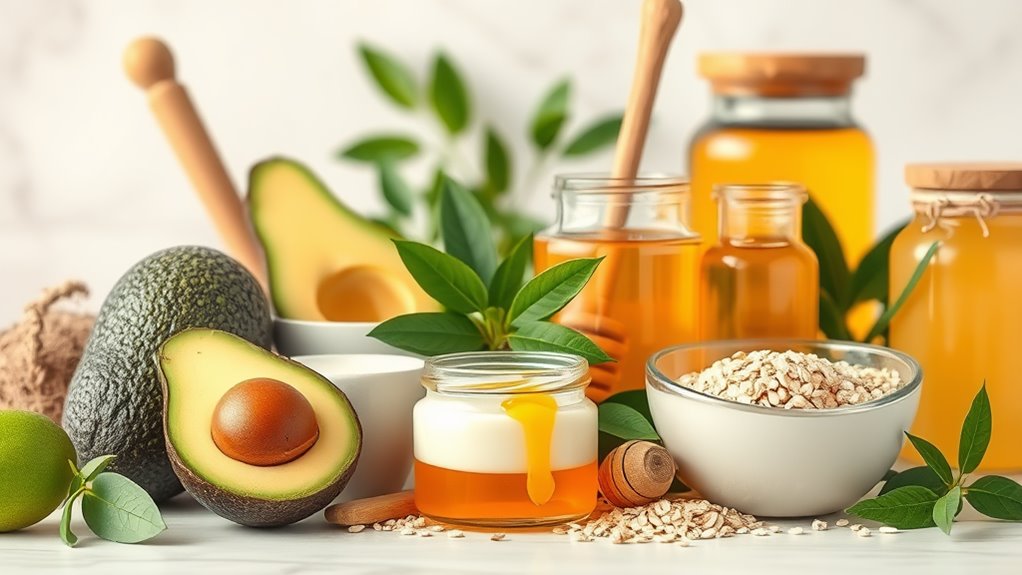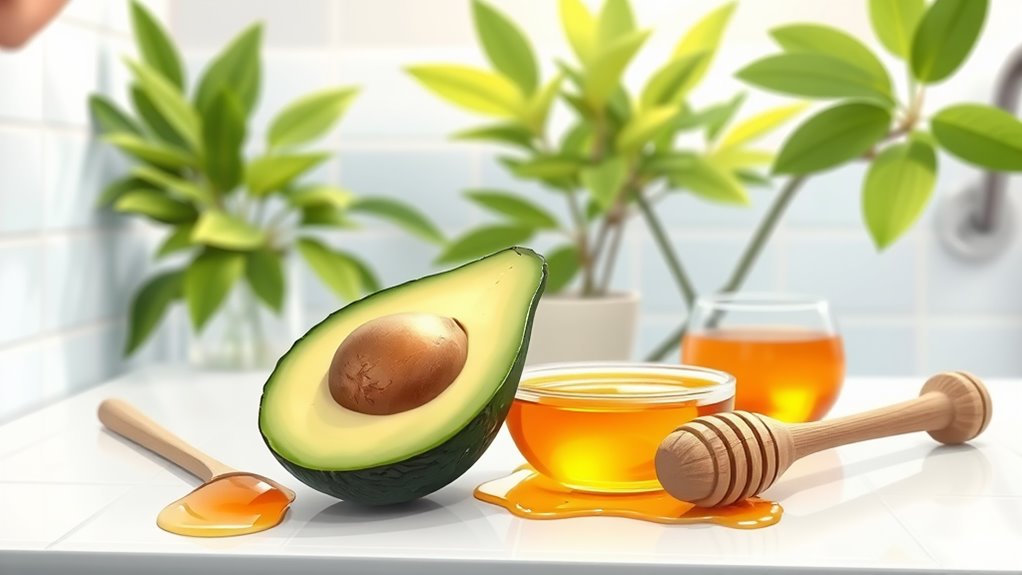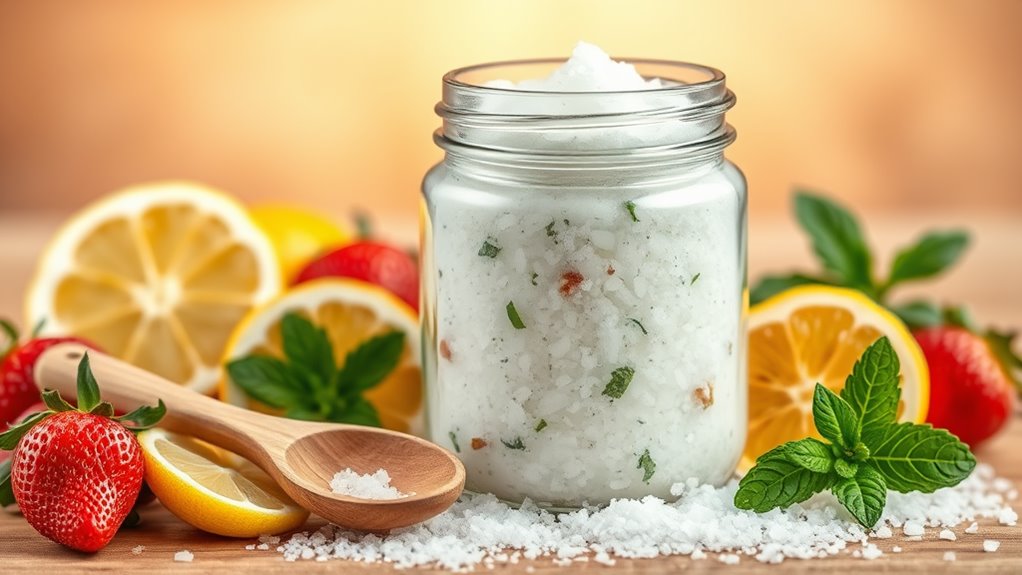Skincare Ingredients You Can Find in Your Kitchen
You might be surprised to learn that some of the best skincare ingredients are already in your kitchen. From honey’s moisturizing properties to avocado’s nourishing benefits, these natural solutions can address various skin concerns. It’s not just about what you apply, but how these ingredients work together to enhance your skin’s health. Curious about how to incorporate them effectively? Let’s explore the power of these kitchen staples.
Key Takeaways
- Honey acts as a natural moisturizer and has antibacterial properties, making it ideal for hydration and acne treatment.
- Avocado is rich in vitamins E and C, providing deep hydration and enhancing skin elasticity.
- Coconut oil serves as a moisturizer and natural makeup remover while also soothing redness and combating acne.
- Yogurt contains lactic acid for gentle exfoliation and probiotics to hydrate and calm irritated skin.
- Lemon is a powerful brightening agent that helps fade dark spots and improves skin texture with its vitamin C content.
Honey: The Natural Moisturizer
Honey is a remarkable natural moisturizer that can transform your skincare routine. Packed with antioxidants, it hydrates your skin while promoting a radiant glow.
When you incorporate honey into your regimen, you’re not just moisturizing; you’re soothing irritation and fighting acne with its antibacterial properties. To master this ingredient, consider mixing honey with other natural ingredients from your kitchen.
This natural ingredients guide can help you create personalized masks or scrubs that cater to your skin’s unique needs. Apply a thin layer of honey directly to your face or blend it with yogurt for added nourishment. Additionally, honey can also help fade dark spots thanks to its skin-rejuvenating properties.
Embrace honey’s versatility and watch as it elevates your skincare practice, leaving you with soft, supple skin that truly shines.
Avocado: Nourishing and Hydrating
Avocado is packed with nutrients that can transform your skincare routine.
You can whip up simple DIY face masks using this creamy fruit, perfect for giving your skin a hydration boost.
If you’re dealing with dry skin, incorporating avocado into your regimen might be just what you need.
Nutrient-Rich Composition
When you think about nourishing your skin, consider the incredible benefits of avocados, which are packed with essential vitamins and healthy fats. This fruit is a powerhouse of nutrients; it’s rich in vitamins E and C, both of which promote skin health.
Vitamin E acts as an antioxidant, protecting your skin from oxidative stress, while vitamin C aids in collagen production, giving your skin firmness and elasticity. The monounsaturated fats in avocados provide deep hydration, ensuring your skin remains supple and soft.
Additionally, the presence of potassium helps to balance moisture levels, preventing dryness. By incorporating avocados into your skincare routine, you’re not just feeding your skin; you’re also empowering it to stay vibrant and healthy. Embrace this natural ingredient for best results.
DIY Face Masks
Creating your own DIY face masks with avocado is an easy way to nourish and hydrate your skin.
Start by mashing half an avocado until smooth. For enhanced benefits, mix in a tablespoon of honey, which adds antibacterial properties, and a splash of lemon juice for brightness.
Apply the mixture evenly to your clean face, avoiding the eye area. Let it sit for 15 to 20 minutes, allowing the nutrients to penetrate deeply.
Rinse off with warm water, and follow with your favorite moisturizer. You’ll notice softer, more radiant skin immediately.
This simple recipe showcases the power of avocados in your skincare routine, and with practice, you’ll master the art of creating effective, natural face masks tailored to your skin’s needs.
Benefits for Dry Skin
Using avocado in your DIY face masks not only provides immediate nourishment but also offers long-term benefits for those battling dry skin. This creamy fruit is packed with essential nutrients that work wonders for hydration and skin health.
By incorporating avocado into your routine, you can enjoy:
-
Deep hydration: Its healthy fats penetrate the skin, locking in moisture.
-
Rich vitamins: Vitamins E and C protect against environmental damage and promote healing.
-
Anti-inflammatory properties: Avocado reduces redness and irritation, soothing dry patches.
-
Enhanced elasticity: Collagen support from antioxidants helps maintain skin firmness.
Yogurt: Probiotic Power for Your Skin
Yogurt is packed with probiotics that can work wonders for your skin, offering benefits like hydration and soothing irritation.
You can easily apply it as a mask or mix it with other ingredients for added effects.
Plus, it’s suitable for various skin types, so you might just find it’s the perfect addition to your skincare routine.
Benefits of Yogurt
When you reach for yogurt, you’re not just choosing a tasty snack; you’re also harnessing the power of probiotics that can work wonders for your skin.
Yogurt is a powerhouse ingredient that offers numerous benefits:
-
Hydration: It moisturizes your skin, leaving it soft and supple.
-
Exfoliation: The lactic acid in yogurt gently exfoliates, removing dead skin cells.
-
Soothing: It calms irritated skin, reducing redness and inflammation.
-
Brightening: Regular use can enhance your complexion, giving you a radiant glow.
Incorporating yogurt into your skincare routine can elevate your results.
You’ll not only nourish your skin but also fortify its defenses against environmental stressors.
Application Methods
There’s a world of possibilities for incorporating yogurt into your skincare routine. Start by applying plain yogurt directly to your face as a mask. Spread a thin layer over clean skin, let it sit for 15-20 minutes, and rinse with lukewarm water for a revitalizing glow.
You can also mix yogurt with honey or oatmeal for added benefits; these combinations enhance hydration and exfoliation. For a soothing treatment, dab yogurt on sunburned areas, allowing it to cool and calm irritation.
If you prefer a more targeted approach, use yogurt as a spot treatment for blemishes by applying a small amount directly to the affected area. With these methods, you’ll harness yogurt’s probiotic power for radiant skin.
Skin Types Suitable
Which skin types can benefit most from yogurt’s probiotic properties? Yogurt is a powerhouse for various skin conditions, making it a versatile ingredient in your skincare routine.
Here’s how it can help:
-
Acne-prone skin: Its probiotics combat acne-causing bacteria while soothing inflammation.
-
Dry skin: Yogurt provides deep hydration, replenishing moisture and improving texture.
-
Sensitive skin: The calming properties of yogurt can reduce redness and irritation.
-
Oily skin: It balances oil production, preventing clogged pores and breakouts.
Incorporating yogurt into your regimen can enhance your skin’s health and appearance.
Whether you use it in masks or as a cleanser, understanding your skin type will help you harness yogurt’s full potential for a radiant complexion.
Olive Oil: Antioxidant-Rich Elixir
Although you might think of olive oil as just a cooking staple, it’s actually an antioxidant-rich elixir that works wonders for your skin.
Packed with vitamins E and K, olive oil combats oxidative stress, helping to prevent premature aging. Its exceptional moisturizing properties make it a perfect choice for dry skin, leaving you with a smooth, radiant complexion.
When you apply it topically, the fatty acids penetrate deeply, nourishing your skin while enhancing its barrier function. You can use it as a standalone moisturizer or mix it with essential oils for added benefits. Additionally, adopting better lifestyle choices can further enhance the effectiveness of olive oil in maintaining youthful skin.
Just remember to choose extra virgin olive oil for maximum potency. Embrace this kitchen gem, and watch your skin transform into a healthier, more youthful version of itself.
Oatmeal: Soothing and Exfoliating
Oatmeal isn’t just a delicious breakfast option; it’s also a powerhouse for your skin. You can harness its soothing and exfoliating properties to enhance your skincare routine effectively. Oatmeal helps calm irritation and redness while gently sloughing off dead skin cells.
Consider these benefits of incorporating oatmeal into your regimen:
-
Soothing: Relieves itchiness and inflammation.
-
Exfoliating: Removes dead skin without harsh abrasives.
-
Moisturizing: Hydrates and nourishes, leaving skin soft.
-
Antioxidant-rich: Protects against environmental stressors.
To create a simple face mask, mix oatmeal with honey or yogurt, apply it to your face, and let it sit for 15 minutes. Rinse off for refreshed, glowing skin. Your skin will thank you!
Coconut Oil: Versatile Beauty Booster
Coconut oil is more than just a kitchen staple; it’s a versatile beauty booster that can transform your skincare routine. Packed with fatty acids, it hydrates and nourishes your skin, making it an excellent moisturizer for dry patches.
You can use it as a natural makeup remover, effortlessly dissolving stubborn products without irritating your skin. Additionally, its antibacterial properties help combat acne, while its anti-inflammatory effects soothe redness.
For hair care, apply coconut oil as a deep conditioner to restore shine and reduce frizz. Just remember to choose organic, unrefined coconut oil for maximum benefits.
Incorporating this powerhouse ingredient into your regimen will elevate your skincare game, giving you that coveted healthy glow.
Lemon: Brightening Agent for Radiance
After exploring the benefits of coconut oil, let’s turn our attention to another powerhouse ingredient in your kitchen: lemon.
This vibrant citrus fruit is packed with vitamin C, making it a brilliant brightening agent for your skin. By incorporating lemon into your skincare routine, you can achieve a radiant complexion.
Consider these benefits:
- Boosts collagen production for youthful skin.
- Fades dark spots and hyperpigmentation effectively.
- Improves skin texture by promoting cell turnover.
- Acts as a natural astringent****, tightening pores.
To harness lemon’s power, dilute its juice with water before applying it to your skin. Additionally, lemon’s ability to reduce hyperpigmentation can complement other natural treatments you may be using.
Just remember to use sunscreen afterwards, as lemon can increase sun sensitivity. Embrace this natural ingredient for that coveted glow!
Sugar: Natural Exfoliant for Smooth Skin
Sugar, a sweet staple in your kitchen, doubles as a fantastic natural exfoliant for your skin. Its granules gently buff away dead skin cells, revealing a smoother complexion. When mixed with an oil, like coconut or olive, you create a nourishing scrub that hydrates while exfoliating. Regular use can enhance your skin’s texture and promote a radiant glow.
| Benefit | How It Works |
|---|---|
| Exfoliation | Removes dead skin cells |
| Hydration | Locks in moisture |
| Softness | Leaves skin feeling silky |
| Brightening | Enhances natural glow |
| Accessibility | Easy to find in your kitchen |
Incorporate sugar into your routine for a luxurious, spa-like experience at home. Your skin will thank you!
Frequently Asked Questions
Can I Use Kitchen Ingredients on Sensitive Skin Safely?
Yes, you can use kitchen ingredients on sensitive skin, but always patch test first. Avoid harsh substances, and choose gentle options like honey or oatmeal. Listen to your skin’s reaction to guarantee safety and comfort.
How Often Should I Apply These Kitchen Skincare Ingredients?
You should apply these ingredients based on your skin’s reaction. Start with once a week, then gradually increase to two or three times, ensuring your skin remains comfortable and free from irritation during the process.
Are These Ingredients Suitable for All Skin Types?
Not all ingredients suit every skin type. You’ll need to assess your skin’s sensitivity and texture. Start with patch tests, and adjust your usage based on how your skin responds to each ingredient.
Can I Mix Different Kitchen Ingredients for Skincare?
Sure, you can mix different ingredients for skincare! Experimenting can enhance benefits, but make certain you’re aware of your skin type and potential reactions. Always patch-test before applying a new combination to your face.
How Should I Store Homemade Skincare Products?
To store homemade skincare products, use airtight containers and keep them in a cool, dark place. Label them with dates, and don’t forget to check for changes in smell or texture before each use.
Conclusion
Incorporating these kitchen ingredients into your skincare routine can transform your skin naturally and effectively. From honey’s moisturizing benefits to lemon’s brightening effects, each ingredient offers unique advantages. Don’t hesitate to experiment with these simple, accessible solutions to address your skin concerns. You’ll not only enhance your skin’s health and radiance but also enjoy the satisfaction of using natural products. So, grab those ingredients from your kitchen and start your journey to glowing skin today!





